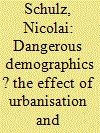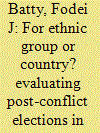| Srl | Item |
| 1 |
ID:
144457


|
|
|
|
|
| Summary/Abstract |
Whether urbanisation promotes or inhibits the risk of civil war is disputed: while case studies usually support the former, quantitative investigations have found either the latter or no significant correlation at all. I argue that this contradiction is due to a conceptual and operational over-aggregation of urbanisation, ignoring its intrastate variation. I claim that a high relative concentration of the urban population and political, economic and social institutions in the largest city – so-called metropolisation – can increase both the motivation for and the feasibility of rebellion in a country. Triangulating case study evidence with a quantitative cross-national time series design, I show that metropolisation significantly and robustly increases the risk of governmental conflict in particular and hence civil war in general.
|
|
|
|
|
|
|
|
|
|
|
|
|
|
|
|
| 2 |
ID:
144461


|
|
|
|
|
| Summary/Abstract |
The utility of post-conflict elections in sub-Saharan Africa has been the subject of lively academic and policy debates. While some scholars associate several electoral outcomes with votes for peace, others argue that post-conflict elections exacerbate existing cleavages and could reproduce the conditions that led to civil war if the right electoral system is not employed. This paper examines these contesting claims using electoral data in a comparative study of the first truly post-conflict elections in Sierra Leone and Liberia. The analysis shows that political leaders in both countries received votes across numerous cleavage lines in contradiction with an ethnic census.
|
|
|
|
|
|
|
|
|
|
|
|
|
|
|
|
| 3 |
ID:
144460


|
|
|
|
|
| Summary/Abstract |
Why are large population movements conflict-prone in some regions while they remain peacefully integrated elsewhere? I argue that clashes between ethnically distinct indigenous populations and migrants – i.e. ‘Sons of the Soil (SoS) conflict’ – erupt when there are large socio-economic and political horizontal inequalities between ‘dominant migrants’ and locals. A comparative case study of two Chinese minority regions based on ethnographic fieldwork and population data provides a vivid illustration of the mechanisms linking migration to SoS conflict. With fewer HIs between migrants and locals, Inner Mongolia avoided many of the violent clashes that were commonplace in Qinghai, a province fraught with disparities.
|
|
|
|
|
|
|
|
|
|
|
|
|
|
|
|
| 4 |
ID:
144458


|
|
|
|
|
| Summary/Abstract |
Research on human rights treaties has mostly reached depressingly similar conclusions – that such treaties and their resulting institutions have little or no impact on human rights. The International Criminal Court, however, possesses significant power to investigate and prosecute violations of international law that equip it with potentially more influence than previous human rights regimes. I suggest, however, that the impact of the ICC on human rights is conditioned by signatory governments’ commitment to good governance and acceptance of the role of the ICC in addressing violations of international law. I develop a two-stage model of ICC ratification and human rights abuse that shows that while many states have ratified the ICC Treaty, not all are committed to stopping the crimes under its jurisdiction. Rather, state commitment to human rights depends first on its commitment to the rule of law within its own borders. Second, commitment to human rights depends on states’ willingness to grant the ICC the powers necessary to carry out its mission. Through a number of statistical tests, I find strong support for these hypotheses on states’ human rights and propensity for violence.
|
|
|
|
|
|
|
|
|
|
|
|
|
|
|
|
| 5 |
ID:
144459


|
|
|
|
|
| Summary/Abstract |
How do civilians respond to and shape civil war? Dominant approaches emphasise territorial control, while rival sociological explanations understand civilian behaviour as rooted in justice, pleasure, and social norms. This paper assesses these divergent sensibilities by examining rebel-controlled areas from Aceh, Indonesia. Many civilians provided the rebels with symbolic support, information and provisions, support that deepened over time as the rebels established control. By disaggregating ‘civilians’ into social groups, a more complex story appears. Only some civilian groups supported the dominant armed group, suggesting that control and sociological approaches can be complementary in explaining civilian behaviour.
|
|
|
|
|
|
|
|
|
|
|
|
|
|
|
|